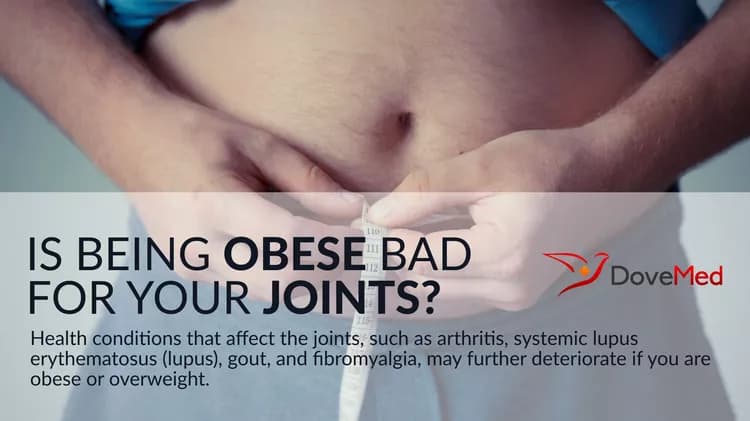It is common knowledge that obesity and being chronically overweight could put you at risk for many diseases and disorders that affect several parts of the body like cancer, metabolic syndrome, hypertension, diabetes, respiratory disorders, apnea, and heart disease, besides affecting the bones and joints. The U.S. Surgeon General states that in America, obesity has reached epidemic proportions, with 31% of men and 35% of women being overweight or obese.
Health conditions that affect the joints, such as arthritis, systemic lupus erythematosus (lupus), gout, and fibromyalgia, may further deteriorate if you are obese or overweight. The weight-bearing joints, such as the hip joint and knee joint, are commonly and sometimes severely affected since they sustain much higher stress. The Centers for Disease Control and Prevention (CDC) informs that on average, 20% of Americans suffer from some form of arthritis. However, this percentage increases to 33% in the case of obese individuals.
Dr. Eric Matteson M.D., Chair of the Rheumatology Division at Mayo Clinic, Minnesota, adds that the knees bear four times extra pressure for every pound of excess body weight. This means that if a person is 25 pounds overweight, then the additional pressure on his/her knee joints will be 100 pounds while standing or walking. In such cases, already damaged joints are severely affected, and individuals who are not affected by arthritis are at a greater risk of developing the condition.
Furthermore, Dr. Matteson informs that extra fat can cause the release of certain chemicals, leading to swollen and inflamed joints. Dr. Jeffrey Katz, M.D., Medicine and Orthopaedic Surgery professor at Harvard Medical School, says that such chemicals (called cytokines and adipokines) have the potential to cause osteoarthritis and rheumatoid arthritis. Therefore, excess body fat act in two aggravating ways: by putting extra biomechanical forces on the joints and by increasing the release of chemicals that harm the joints further.
Dr. Jon Giles, M.D., assistant professor of Medicine in the Division of Rheumatology at Columbia University College of Physicians and Surgeons, New York City, informs that patients with rheumatoid arthritis (RA) have a 50% higher risk for cardiovascular mortality than those without RA. Thus, obesity puts you at risk for RA, which in turn can increase the chance of cardiovascular diseases.
The Arthritis Foundation notes that obesity is closely associated with the painful joint disorder, gout. According to the foundation, about 70% of the individuals with gout are overweight, and individuals who are obese have a ten times greater risk of developing gout than those within a normal weight range. It is explained that increased weight affects kidney function because ‘gout-causing’ uric acid is not easily eliminated from the body.
Obesity is also a key risk factor for more severe forms of psoriasis. Over 30% of individuals with psoriasis are at risk for the inflammatory psoriatic arthritis. Young, obese adults with psoriasis have three times the risk of developing psoriatic arthritis than normal adults, and it can occur much earlier in their life. Similarly, obesity is also linked to lupus and fibromyalgia; both are disorders that cause pain in the joints.
It is difficult to treat joint disorders, like arthritis, in obese or overweight individuals using joint replacement surgical procedures, such as for the hip and knee, since the replaced prosthetic or artificial joint may not be able to take the load and perform efficiently if the individual is obese.
Obesity is indeed bad for one’s joints, apart from the host of medical health conditions it makes you vulnerable to. The Harvard Medical School says that even during joint pain, it is advised to exercise while using the right technique and correct set of exercises. Apart from the long-standing health benefits, this can also help manage overweight and obese states.
References:
http://www.arthritistoday.org/about-arthritis/arthritis-and-your-health/obesity/fat-and-arthritis.php (accessed on 12/10/2014)
https://stanfordhealthcare.org/medical-conditions/healthy-living/obesity.html (accessed on 12/10/2014)
http://win.niddk.nih.gov/publications/health_risks.htm (accessed on 12/31/2014)
http://www.nhlbi.nih.gov/health/health-topics/topics/obe/risks (accessed on 12/31/2014)
http://www.hopkinsarthritis.org/patient-corner/disease-management/role-of-body-weight-in-osteoarthritis/ (accessed on 12/31/2014)
http://www.mayoclinic.org/diseases-conditions/obesity/basics/causes/con-20014834 (accessed on 12/31/2014)
http://www.acsm.org/access-public-information/articles/2012/01/19/obesity-and-exercise (accessed on 12/31/2014)
http://www.ukgoutsociety.org/docs/goutsociety-allaboutgoutanddiet-0113.pdf (accessed on 12/31/2014)
http://www.health.harvard.edu/healthbeat/the-secret-to-joint-pain-relief-exercise?utm_source=review&utm_medium=email&utm_content=body1e&utm_campaign=TOP2014&j=33095615&e=joseph@dovemed.com&l=16278673_HTML&u=414988426&mid=148797&jb=0 (accessed on 12/31/2014)
Helpful Peer-Reviewed Medical Articles:
van Romunde, L. K. J., & Valkenburg, H. A. (1988). OSTEOARTHRITIS AND OBESITY IN THE GENERAL POPULATION. A follow-up study of osteoarthrosis of the hip, 15, 39.
van Saase, J. (1989). Osteoarthrosis in the general population: a follow-up study of osteoarthrosis of the hip.
Fortier, N., Sheppard, J., & Strasser, S. (2015, July). Parameter estimation in Bayesian networks using overlapping swarm intelligence. In Proceedings of the 2015 Annual Conference on Genetic and Evolutionary Computation (pp. 9-16). ACM.
Related Articles
Test Your Knowledge
Asked by users
Related Centers
Related Specialties
Related Physicians
Related Procedures
Related Resources
Join DoveHubs
and connect with fellow professionals


0 Comments
Please log in to post a comment.